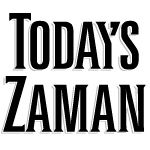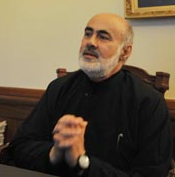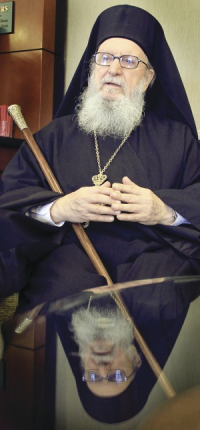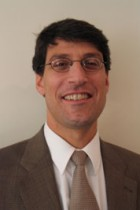
Deprecated: trim(): Passing null to parameter #1 ($string) of type string is deprecated in /home/aoiusa/public_html/wp-content/plugins/sexybookmarks/public.php on line 388
Deprecated: trim(): Passing null to parameter #1 ($string) of type string is deprecated in /home/aoiusa/public_html/wp-content/plugins/sexybookmarks/public.php on line 394
Deprecated: trim(): Passing null to parameter #1 ($string) of type string is deprecated in /home/aoiusa/public_html/wp-content/plugins/sexybookmarks/public.php on line 400
Source: Today’s Zaman
The spokesperson of the Greek Orthodox Patriarchate, Father Dositheos Anağnostopulos, has said Turkish Prime Minister Recep Tayyip Erdoğan saved the future of the patriarchate by offering Turkish citizenship to a number of archbishops in 2009.
In an interview with the Star daily, Anağnos-topulos said there were 12 archbishops on the patriarchate’s Spiritual Board at the time. “Most of [those archbishops] are very old. In order to become a member of this board, one has to be a Turkish citizen. If the patriarch dies one day, it seemed unlikely that a new patriarch would be elected from the board [due to the members’ age]. This danger has now passed. The prime minister attended a luncheon on Büyükada in August 2009 … and said the problem with the Spiritual Board will be overcome if archbishops applied to become Turkish citizens. He assured us that applicants would be granted citizenship,” the spokesperson stated.
Anağnostopulos defined the prime minister’s remarks as the “most positive moment in his lifetime.” “After the prime minister’s call, 27 of 35 archbishops abroad submitted applications to become Turkish citizens. Thirteen of them have already been granted citizenship,” he added. In 2010, CNN International ran a story on the Greek Orthodox Patriarch in which it suggested that Patriarch Bartholomew could ultimately be the last patriarch if Turkish laws, demographics and attitudes do not change. According to Anağnostopulos, however, this is no longer the case, thanks to Erdoğan.
The spokesperson also said Erdoğan and Deputy Prime Minister Bülent Arınç were the first state authorities to express their wish to re-open a closed Greek Orthodox seminary on Heybeliada, off the coast of İstanbul. The Halki Seminary was closed in 1971 in accordance with a law that put religious and military training under state control.
In addition, Anağnostopulos said the Halki Seminary is of high importance for the Greek Orthodox population as it was once a base where clerics were trained for the religious community.
“An argument has been put forward by some people in Turkey. They say the Greek Orthodox population comprises only 2,500 people, and we needn’t train clerics for so few people. They say we may ‘import’ clerics from abroad. However, they should know that the Greek Orthodox patriarch is the most senior among Orthodox churches in the world. This is why he was granted the ecumenical title. We also have followers outside of İstanbul, including in North and South America and some parts of Europe, Hong Kong, Australia and New Zealand. Their priests and archbishops are appointed by our patriarch. And for their appointment, it is a must for candidates to have graduated from a seminary,” he stated.
Anağnostopulos also said the re-opening of the Halki Seminary would not run contrary to the Treaty of Lausanne. He also ruled out fears that the “Byzantine spirit” would be revived if the seminary is re-opened.
“Some fear that it will go against the principles of the Republic of Turkey if the patriarchate is a very strong institution. This is wrong. The Republic of Turkey has a secular character. Every religious group has the right to continue its activities provided they are not engaged in politics. It is now a fact that the closing down of the Halki Seminary was not legal. I personally believe that the seminary was used as a trump card in the Cyprus issue and was eventually shut down,” he noted.




